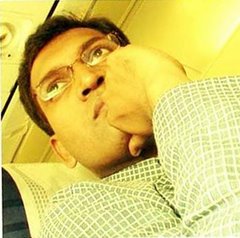'I enjoy making mischief' - Peter Kosminsky personified; 51 and a veteran documentary film maker with two Hollywood movies and an umpteen number of controversial dramas to his name.
If I have to quote The Guardian – ‘Every time you see the name Peter Kosminsky attached to a TV billing, you know that you're going to see the best thing on that month, or even year. This is the man who made Warriors; the unforgettable Bosnian peacekeepers drama, and 2002's vilification of New Labour, The Project. But, what stands out is The Government Inspector (Channel 4) which surpassed even the weighty expectations on the Kosminsky brand. This television drama hit all the right buttons - action, comedy, pathos, satire - as well as shedding loads of righteous political anger.’

We saw The Government Inspector written and directed by Peter Kosminsky a week back at a screening in the Media School of the University and this week we were face to face with the man himself. The Government Inspector is the story of the events which led to the suicide of UN weapon’s inspector Dr David Kelly in July 2003. Dr. Kelly was publicly named as the source for a BBC report and that the dossier into Iraqi weapons had been "sexed-up" and was thrown into the public spotlight which led him to commit suicide after which the Hutton Inquiry was set up to investigate the whole matter.
What inspired Kosminsky to script and make such a controversial film? His father, he answered. David Kelly reminded him of his father who died few weeks after Peter was offered to make the film - July 23, 2003- the day of his parent's 50th wedding anniversary. Now, almost four years later, He can't be sure whether his decision to accept was influenced by memories of his dead father or by something totally different. 'It seems likely that it was. In purely practical terms,' he adds.
Peter Kosminsky patiently answered all the queries we volleyed to him. He gave us a detailed account on how his research team worked for over a year which finally led him to a close scrutiny of the Hutton Report, in his own hours in the gallery during the inquiry and the 120 interviews he conducted with the players in that tragic story. 'I had to read around 10,000 pages of the public inquiry’, he told us. Some of the people he spoke to had only bit- parts whereas others had starring roles. From Iraq to Russia all have had their anonymity protected by one filmmaker with a track record for making controversial dramas based on real events.
The movie left a lot of questions in our minds. Kosminsky was prompt in responding to one such question- Was David Kelly carrying a bundle of guilt? He might have in some way realised that he might be a part of people who made way for the Iraq invasion by continuously believing that the weapon of mass destruction was there somewhere in Saddam's country.
Kosminsky, himself is still hunting for some unsolved questions after 2 years of making the documentary - Questions which only Dr David Kelly could have answered. What did David Kelly do during the two hours after his arrival in London and before his appearance at the Ministry of Defence? The film maker knows he probably will never be able to solve the mystery.
Another revelation Kosminsky makes, probably for the first time, is regarding the BBC reporter Andrew Gilligan, over the much controversial doggy dossier due to which Kelly had reportedly committed suicide – 'During my research on Gilligan's style of work – I came across a work where Gilligan specifically mentions the word 'sexed-up', which he used for the government dossier. This indicates that probably it was not David Kelly but Gilligan's word which was attributed to Dr Kelly in the report.' As there was no other back up support – Kosminsky did not use this finding in the movie. Making the film was not easy task, recalls the director. Kosminsky didn't assume the government would cooperate, but neither had he expected it to stop him speaking to any army personnel, bar him from all military bases and even prevent him from filming at museums. What, he wonders, could it be so afraid of?
Before bidding us goodbye, Kosminsky recalled a meeting he had had with BBC editors after the screening of Warriors, a film on conflict. It was a procedural session called Programme Review; always held after an important or controversial broadcast. Kosminsky was struck by the attitude of Mark Damazer; then head of BBC News and now controller of Radio 4. Damazer couldn't understand why one single drama had had a far greater public impact than years of straight reporting of the Bosnian conflict.
"My comment was that they are not mutually exclusive,” says Kosminsky. "The drama would not exist without the reporting because a lot of the reporting was our source material. But people need both. They need the immediate, dispassionate report but they also need the dramatist's take. They need the human story." It's tempting to say that what they really need is the truth, but as historians, journalists and dramatists know only too well, that quality is slippery indeed. Only by doubting do we come at it - and it was Cicero, by the way, who said that.


1 comment:
Like a true journalist exactitude is the essence of your writing...a dispassionate reporting in the truest sense of the term...Keep it up ...cheers
Chayan
Post a Comment